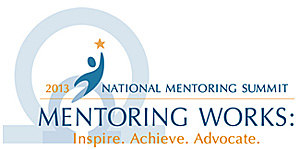 On January 24–25, 2013, OJJDP joined with other partners, including MENTOR, the Corporation for National and Community Service, Harvard School of Public Health, and United Way Worldwide, to host the third annual National Mentoring Summit in Washington, DC. The summit brought together youth mentoring organizations along with government, civic, research, and corporate leaders to evaluate best practices, review new research, and chart the mentoring field's future.
On January 24–25, 2013, OJJDP joined with other partners, including MENTOR, the Corporation for National and Community Service, Harvard School of Public Health, and United Way Worldwide, to host the third annual National Mentoring Summit in Washington, DC. The summit brought together youth mentoring organizations along with government, civic, research, and corporate leaders to evaluate best practices, review new research, and chart the mentoring field's future.
The event included an update on The Center for Evidence-Based Mentoring, a partnership between the University of Massachusetts–Boston and MENTOR that aims to make research findings on mentoring more accessible to practitioners, policymakers, and the public and to increase practitioners' skills and knowledge in applying evidence-based practices to their work.
At the summit, experts conducted workshops on a range of topics, including:

Photo courtesy of Corporation for National and Community Service.
On the first day of the summit, OJJDP Acting Administrator Melodee Hanes offered remarks at a luncheon plenary session. Later, Ms. Hanes, U.S. Representative Chaka Fattah (D–PA), and MENTOR CEO David Shapiro convened a listening session with leaders from national mentoring organizations and social service agencies to foster increased coordination and alignment of their efforts to improve outcomes for youth.
- Corporate and community partnerships.
- Recruiting and retaining mentors.
- Trends in mentoring research.
- Training and technical assistance for mentoring programs.
- Mergers and consolidations of mentoring programs in response to fiscal constraints.
- Mentoring as an avenue for college preparation and careers.
- Mentoring to promote skills in science, technology, engineering, and mathematics.
- Mentoring youth in foster care.
- Mentoring youth in Indian country.
- Mentoring gay youth.
- Mentoring programs for adjudicated youth and children of incarcerated parents.
- Mentoring in afterschool settings.
- Men in mentoring.
- School-based peer mentoring.
- Prioritizing youth safety with research-based mentor screening practices.
- E-mentoring.
- Family involvement in youth mentoring.
OJJDP staff conducted sessions on the Office's Multi-State Mentoring Initiative, which supports organizations that operate mentoring programs for at risk and high-risk youth in at least 5 states, and the Mentoring Enhancement Demonstration Program, which incorporates advocacy and teaching functions into mentors' roles in 32 sites across the country. The American Institutes for Research will conduct an evaluation of the program.
Research findings support the effectiveness of mentoring for improving outcomes across behavioral, social, emotional, and academic domains of youth development. Recognizing these substantial benefits, OJJDP has long supported mentoring. In fiscal year 2012, the Office awarded more than $68 million to national and local organizations to strengthen, expand, and implement youth-mentoring activities and youth-development programming throughout the nation.
January 2013 marked the 12th anniversary of National Mentoring Month, an annual media campaign to recruit volunteer mentors for youth.
Resources:
To access mentoring resources, visit the Web sites of MENTOR, The Center for Evidence-Based Mentoring, and OJJDP. In addition, the National Criminal Justice Reference Service's Mentoring Resources Special Feature contains links to publications and related organizations, agencies, funding resources, and Web sites that focus on mentoring activities. More information about National Mentoring Month is available online.
